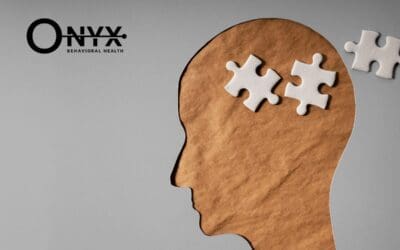Bipolar Disorders

One of the most misunderstood mental health disorders, bipolar disorder, is something we think would be obvious. However, many people with this diagnosis live full, productive lives if their condition is managed correctly.
What is Bipolar Disorder?
Bipolar is characterized by changes in an individual’s mood, emotions, and energy. This could include intense episodes of depression and/or mania that last days or weeks.
Most individuals who experience bipolar begin to develop symptoms during young adulthood, but symptoms do vary. Depending on symptoms, bipolar disorder can be classified into different types, such as bipolar I, bipolar II, or cyclothymic disorder.
At Onyx Behavioral Health, we treat individuals diagnosed with any of these types of bipolar diagnoses.
%
of U.S. adults had bipolar disorder in the past year
%
of U.S. adults experience bipolar disorder at some time in their lives.
A deeper look at each bipolar classification:
Bipolar disorder comes in three main types, as outlined in the Diagnostic and Statistical Manual of Mental Disorders (DSM-5). These types categorize the different experiences and severity levels of the condition. The bipolar classifications are:
Bipolar I
Bipolar II
Characterized by episodes of depression and hypomania (less severe mania episodes), bipolar II is sometimes misdiagnosed as another mental health condition such as depression.
Cyclothymic Disorder
Characterized by less severe or shorter, but recurrent hypomania and depressive episodes, Cyclothymic disorder can sometimes go undiagnosed for longer periods of time. However, individuals with this condition can benefit greatly from residential treatment programs.
Symptoms of Bipolar Disorder
Bipolar disorder, regardless of the specific type, presents with distinct mood episodes: depression and mania.
During a depressive episode, individuals may experience intense sadness, hopelessness, and feelings of worthlessness. They may lose interest in once-enjoyed activities, experience significant changes in appetite or sleep, and withdraw from social interaction.
In contrast, manic episodes are characterized by extreme highs in mood, energy, and activity levels. People in a manic state may talk very quickly about grand ideas, become easily distracted, and engage in risky or impulsive behaviors.
They may also experience inflated self-esteem, racing thoughts, and require much less sleep than usual. Here is what each one looks like:
Depression
Frequent feelings of sadness, hopelessness, or irritability
Lack of energy
Difficulty concentrating and remembering things
Loss of interest in everyday activities
Feelings of emptiness, worthlessness, guilt, or despair
Persistent pessimism about everything
Self-doubt
Delusions, hallucinations, and disturbed or illogical thoughts
Lack of appetite
Insomnia
Suicidal thoughts
Mania
Extreme feelings of happiness, elation, and joy
Rapid speech pattern
High energy levels
Feeling self-important
Having lots of “great new” ideas and “important” plans
Easily distracted
Irritability or agitation easily triggered
Delusions, hallucinations, and disturbed or illogical thoughts
Lack of appetite
Insomnia (due to lots of energy)
Wreckless or problematic behavior
Impulsive decision making
Doing/saying things perceived by others as risky or harmful
Diagnosis & Treatment of Bipolar Disorder
Like many conditions, getting a diagnosis can sometimes be a process. When symptoms present, it is recommended to start with a visit to your healthcare provider. They will run a number of tests to rule out other possible causes for your symptoms. If there is no physical reason identified to explain your symptoms, a mental health evaluation would be the next step.
In the event of a diagnosis, an individual treatment plan is going to be recommended. Standard treatment may include a combination of behavioral therapy and medication. Mood stabilizers and antidepressants are common medications used, but in some cases, an antipsychotic may be prescribed to manage manic episodes.
For individuals with bipolar disorder, a comprehensive treatment plan goes beyond medication. Behavioral health interventions play a crucial role by addressing behaviors, lifestyle habits, and relationships.
What Causes Bipolar Disorder?
We know that most commonly, the onset of bipolar disorder happens in one’s early 20s. However, what actually causes this condition? Is it something a person is genetically predisposed to or is there something that happens to people in their 20s that causes the onset?
Like all other mental disorders, there is usually a mixture of factors that contribute to bipolar disorder. Yes, if others in your family have bipolar, then you are more likely to develop it as well. Yet, it is not a guarantee. According to Mayo Clinic, risk factors for bipolar include:
- Having a first-degree relative, such as a parent or sibling, with bipolar disorder
- Periods of high stress, such as the death of a loved one or other traumatic event
- Drug or alcohol abuse
Overcoming Bipolar Disorder at Onyx
At Onyx Behavioral Health, we take mental health treatment to the next level. While we provide traditional treatment options for conditions such as Bipolar Disorder, we don’t just stop there. True healing sometimes requires big changes that are challenging to make in your current situation. That is why we provide a highly effective residential treatment program that includes a safe space to focus on recovery, develop coping skills, and make lifestyle changes for the long term.
Sources
Discover Healing with Onyx Behavioral Health
Related Articles
Bipolar II: Everything You Need To Know
Bipolar disorder affects about 5.7 million adult Americans, as reported by the National Institute of Mental Health. Within this broad category is Bipolar II disorder. Unlike Bipolar I, Bipolar II features periods of high energy or hypomanic episodes mixed with times...
A Beginner’s Guide to Cyclothymic Disorder
Cyclothymic disorder is a term that is not as widely recognized as others within the bipolar disorder spectrum. This condition presents a milder form of emotional highs and lows, yet it significantly shapes the lives of those it touches. This beginner's guide aims to...
The Difference Between Borderline Personality Disorder & Bipolar
Up to 40% of individuals with bipolar disorder receive an initial misdiagnosis. While this disorder shares specific symptoms with borderline personality disorder (BPD), its core characteristics and treatment approaches differ significantly. Misunderstanding these...




 Michaela Welk, LMHC
Michaela Welk, LMHC Bunny Berman
Bunny Berman Tank
Tank Richard E. LoSardo, MD
Richard E. LoSardo, MD
 Christopher Payne
Christopher Payne Bernard Benjamin
Bernard Benjamin Tiffany Bellino
Tiffany Bellino